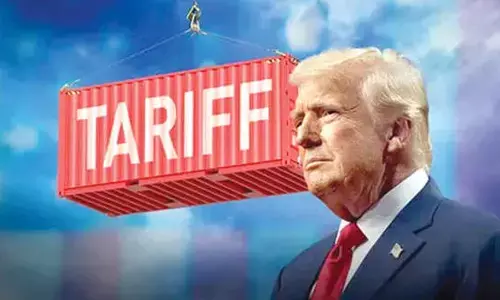Decriminalising black money

he BJP-led government’s vigorous attempts to promote electoral bonds have exposed the blatant hypocrisy within
The BJP-led government’s vigorous attempts to promote electoral bonds have exposed the blatant hypocrisy within. BJP, which had imposed the catastrophic demonetization to unearth black money, has been, on the contrary, attempting to provide legitimacy of black money through the electoral bonds.
The non-disclosure of identities of donors/institutions/companies/entities, as sought by the ruling party, will open the gateways for untrammeled accumulation of black money and quid pro quo linkages between the donors’ and the political parties. The Supreme Court on February 15 stymied the ruling party’s efforts to sanctify black money. Chief Justice of India DY Chandrachud, while delivering the unanimous verdict of the five-bench constitutional bench, said “Crucial aspect of expansion of right to information is that it is not confined to state affairs but also includes information necessary for participatory democracy. Infringement to the right to information is not justified by the purpose of curbing black money.”
Not surprisingly, the ruling was met with absolute silence by not just the BJP but all the parties without exception. Quite understandable, since they were all on the same page, because of the benefits to be accrued through electoral bonds.
Legalizing anonymous electoral bonds has widespread ramifications and repercussions, creating socio-economic and political hegemony and anarchy. There will be many takers for the electoral bonds, since it is not a sense of altruism that inspires the donors, but the potential returns on the contributions. Black money not only becomes legally acceptable, but also reap in bounties of benefits for the donors. They can wield unfettered power and influence over the governments, manipulate and formulate policies in their favor, establish monopolies, and promote puppet regimes.
From a futuristic perspective, if the electoral bonds do materialise, then it could well mean curtains for democracy. For instance, we can imagine a scenario in which anonymity and decriminalization of black money can lead to financial and political anarchy. It would trigger a rat race and competition among the black-moneyed worthies for gaining the ‘Goodwill’ of those in power. Policies will be designed to accommodate the highest bidders/takers of electoral bonds. Moreover, government projects will be privatized to benefit the highest bidders of the electoral bonds. Project will be awarded not to the lowest bidders in the auction process, but to those who possess high valued electoral bonds.
In addition to the fact that attempts to insulate political parties and donors from audit scrutiny reeks of dubious and deceptive intent, the illegality of anonymity in electoral bonds becomes evident when viewed from the perspective of listed public companies. Here in this case, it is mandatory to audit and share every transaction with the shareholders. Will the spending on electoral bonds be reflected in the balance sheet of the listed company? If so, under what head of account will it be reflected? Another big question is: will the company divulge the spending towards electoral bond or would it be clandestine transaction? If the company resorts to the latter, then it would invite a plethora of legal actions. Decriminalisation of black money will disrupt economic eco system and result in dwindling taxable revenues. For instance, business biggies may consider to stash and conceal a considerable chunk of their income –unaccounted and unaudited- and allocate the same for purchasing electoral bonds. The contribution to the political parties, specifically the ruling political parties, could in all probability ensure huge ‘quid pro quo’ dividends.
While, the practice of unhindered hoarding black money gains momentum with increasing quantum taxable income revenues will inevitably result in a free fall. For instance, can evade taxes by invest RS.2000 black money in electoral bonds and gain “goodwill’, while the country’s coffers is deprived of the taxes from the same amount. The non-disclosure of the source is a double whammy for both the contributors and the political parties, since the latter also need to disclose the unaudited, unrecorded, illegal cash flow into their accounts.
The Supreme Court judgment and intervention has come at an appropriate time, since legalising non-disclosure would have resulted in a downpour and deluge of cash flow during the forthcoming elections. Going by precedents, constitutional calisthenics by the ruling political establishment to amend and manipulate the circumvent the judicial ruling, cannot be ruled out in the near future. Writer is a Senior Journalist with experience in print, television and digital media.










